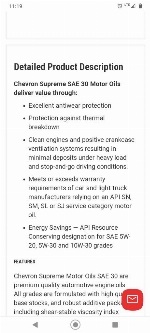Yes those old Bugs I believe if I can remember back that far have a factory recommended OCI of 2000 miles.Does your bug have an actual oil filter on it, or just a screen you have to clean at oil change time?. My '66 bug had the screen "filter".,,
You are using an out of date browser. It may not display this or other websites correctly.
You should upgrade or use an alternative browser.
You should upgrade or use an alternative browser.
Straight 30w in Hot Climates
- Thread starter ad244
- Start date
I guess you can buy city star or some other nd oil at a liquor store on the bad side of the tracks. But you won't normally find it at an auto parts store. Every sae 30 I run across has the latest api ratings. Such as this.I did some looking around and what I've found is, 30 wt oil could be used in a car, but they are mostly non-detergent. Most articles start off saying 30 wt, but start talking about 5 or 10w30 wts. Which pretty much all are detergent oil. Here's an example.,, https://findanyanswer.com/can-i-use-sae-30-instead-of-5w30-in-my-car
Attachments
My 65 is a stock 1600 since I converted it to 12 volt system. Yes it just has the screen in the bottom around the oil pickup tube. I put a magnetic drain plug in it to capture ferrous stuff. Bought this motor broken for $10.00 and did a rebuild on it with new piston rings and exhaust valves and valve guides. It has been running great now for over 30K miles and still gets 29-30mpg. Most reliable old car you can own. We drag it along behind our camper too.
I belive that oil coking is caused by shutting off a hot engine that was worked hard without sufficient time given at idle for the turbo(s) to cool.Yes, I was meaning the function of the VII. Now there are 2 choices, one a grp3 with VII like 5W40, and a group II with no VII, SAE 30. Is the grp II SAE 30 just as coking resistant ?. Is the VII the main culprit for turbo passage coking ?
A locomotive engine for example has an "auxillary turbo pump" that turns on when the engine stops for any reason. It pumps
engine oil through the turbo for about 10 minutes after shut down.
Indeed.I belive that oil coking is caused by shutting off a hot engine that was worked hard without sufficient time given at idle for the turbo(s) to cool.
A locomotive engine for example has an "auxillary turbo pump" that turns on when the engine stops for any reason. It pumps
engine oil through the turbo for about 10 minutes after shut down.
- Joined
- May 16, 2021
- Messages
- 414
I ran straight 30 wt Havoline in a new 1993 Ford F-150 2wd, 300 six cylinder, 5 speed stick shift I bought for 12 yrs and 293,000 miles. In Southern Missouri. Was so far, the best truck I've ever owned.Hi BITOG users,
Anybody using straight 30wt in hotter climates n their passenger vehicles? - I'm talking the greater CA/AZ area where temps rarely dip into freezing temps. Would a vehicle which is spec'd for 5w-30 have any issues with this?
Thanks!
Sold it and the guy drove it for several yrs afterward.
dnewton3
Staff member
Longevity of those old 4.9L/300ci Fords isn't unheard of. Same can be said of the ol' slant-6 from Chrysler. The fact that you ran straight 30 grade probably had little to do with the success over any other reasonable multi-grade which likely could do the same. Those engines ran well on just about any lube, and considering the lower quality of lubes "back in the day", it was more a testament to the engine lube system design combined with a relatively low power-density (low stress) engine.I ran straight 30 wt Havoline in a new 1993 Ford F-150 2wd, 300 six cylinder, 5 speed stick shift I bought for 12 yrs and 293,000 miles. In Southern Missouri. Was so far, the best truck I've ever owned.
Sold it and the guy drove it for several yrs afterward.
We had a member here who run something like 400k+ (IIRC) on an old 6.9L IDI Ford/Navistar engine using straight 30 grade, mostly in FL I believe. It was stolen from him and was still running great upon it's undesired exit from his use. I think the warms of FL didn't necessitate a multi-grade, where it may have been more beneficial in much colder areas.
Last edited:
- Joined
- May 16, 2021
- Messages
- 414
I do agree with ya.Longevity of those old 4.9L/300ci Fords isn't unheard of. Same can be said of the ol' slant-6 from Chrysler. The fact that you ran straight 30 grade probably had little to do with the success over any other reasonable multi-grade which likely could do the same. Those engines ran well on just about any lube, and considering the lower quality of lubes "back in the day", it was more a testament to the engine lube system design combined with a relatively low power-density (low stress) engine.
Similar threads
- Locked
- Replies
- 5
- Views
- 1K
- Replies
- 113
- Views
- 9K
- Replies
- 4
- Views
- 800
- Locked
- Replies
- 80
- Views
- 21K


